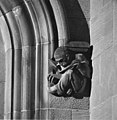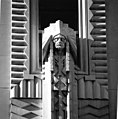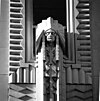Wirt C. Rowland: Difference between revisions
→Designs for Albert Kahn Associates, 1915 to 1922: Added Hill Auditorium with source ref |
→Designs for O'Dell and Rowland, 1931 to 1938: Added Good Houskeeping house with source ref |
||
| Line 80: | Line 80: | ||
* L. Black Co. store (1932), 1420 Woodward Ave., [[Detroit, Michigan]] |
* L. Black Co. store (1932), 1420 Woodward Ave., [[Detroit, Michigan]] |
||
* [[Good Housekeeping]] Stran-Steel House (1933) for the [[1933 Homes of Tomorrow Exhibition]] at the [[Century of Progress]] International Exposition, Chicago, Illinois<ref name=goodhouse>''Chicago Daily Tribune'', June 4, 1933, p. E7.</ref> |
|||
* Maire Elementary School (1936), [[Grosse Pointe, Michigan]] |
* Maire Elementary School (1936), [[Grosse Pointe, Michigan]] |
||
* Stevens Memorial Chapel - chancel section, including altar, reredos, and organ screen (1938), [[St. John's Episcopal Church (Detroit, Michigan)|St. John's Episcopal Church]], Detroit, Michigan |
* Stevens Memorial Chapel - chancel section, including altar, reredos, and organ screen (1938), [[St. John's Episcopal Church (Detroit, Michigan)|St. John's Episcopal Church]], Detroit, Michigan |
||
Revision as of 15:27, 5 October 2013
Wirt C. Rowland | |
|---|---|
| Born | December 1, 1878 |
| Died | November 30, 1946 (aged 67) |
| Nationality | American |
| Occupation | Architect |
| Practice | George D. Mason Co. Designer (1902-09) Malcomson and Higginbotham Albert Kahn Associates Smith Hinchman & Grylls |
| Buildings | Bankers Trust Co Building (1925) Buhl Building (1925) Penobscot Building (1928) Guardian Building (1929) |
Wirt Clinton Rowland (December 1, 1878 - November 30, 1946) was an American architect best known for his work in Detroit, Michigan.[1][2]
Biography


Rowland was born December 1, 1878 in Clinton, Michigan to Clinton Charles and Melissa Ruth Rowland.[3] In 1901, he landed a job as an office boy for the Detroit firm of Rogers and MacFarlane, quickly moving on to the prestigious George D. Mason firm. In 1909, he joined the office of Albert Kahn, who had also apprenticed under Mason. In 1910, with the encouragement of both Mason and Kahn, Rowland attended the Harvard Graduate School of Design in Cambridge, for a year.[1]
The combination of Rowland's natural design talent, Harvard education, and Detroit's healthy economy positioned him to make major contributions to the city's architecture. Rowland is a case study in design attribution. In 1911, in the office of Kahn, he and Ernest Wilby are said have been primarily responsible for the Hill Auditorium at the University of Michigan. Through 1915 Rowland worked for the local firm of Malcomson & Higginbotham. He then returned to Kahn's office, contributing to the firm's classic projects, namely the Hatcher Graduate Library at the University of Michigan, the Detroit News Building, the First National Building(1922), and the General Motors Building (1922) renamed Cadillac Place.[1]
Rowland's career peaked as Head Designer (1922–1930) of Smith Hinchman & Grylls (SmithGroup). There, he designed a dozen major structures in downtown Detroit; among these, are a number of the city's most accomplished and evocative buildings. To a large extent, Rowland helped define Detroit's architectural genre.[1][4] Of the Guardian building Rowland said, We no longer live in a leisurely age, . . What we see we must see quickly in passing, and the impression must be immediate, strong, and complete. Color has this vital power.[5] For the Guardian Building, he had assembled a multitude of artisans, mosaicists, sculptors, painters, and tile manufacturers including Corrado Parducci, muralist Ezra Winter, and tile from the Rookwood and Pewabic pottery companies.[1] He thus recreated the architectural synthesis of a medieval cathedral. Hence, Rowland had reached a climax, when his Union Trust/Guardian Building became known as the Cathedral of Finance.[6]
The Guardian Building opened in 1929. With the onset of the Great Depression, most of the employees of Smith Hinchman & Grylls were let go, including Rowland. In January of 1931, he joined in a partnership with his long-time friend, Augustus (Gus) O'Dell. The firm secured a small number of important commissions supplemented with reconstruction necessitated by the widening of Woodward Avenue, and by insurance re-valuations of existing buildings.
Late in life, he returned to a purer, Gothic idiom for his last few projects, notably preliminary sketches for the Kirk in the Hills. The church was built after the war to a design by George D. Mason & Co., Rowland having died in 1946. He was a member of the Chandler Park Partnership, a group of nineteen architects and engineers that designed Parkside housing project (1935–38) in Detroit.During World War II, the Guardian Building would serve as headquarters for war time production.[6]
Rowland Designed Structures
- T. B. Rayl Company Building (1915) Woodward Avenue, Detroit, Michigan; designed by Rowland for Baxter and O'Dell, featured an early use of colored terra-cotta[7]
Designs for George D. Mason, 1902 to 1909
- Pontchartrain Hotel (1907), Detroit, Michigan
Designs for Malcomson & Higginbotham, 1912 to 1915
- Northern High School (1915), Detroit, Michigan
- Southeastern High School (1915), Detroit, Michigan
- Isabell F. Thirkell Elementary School (1915), Virginia Park Historic District, Detroit, Michigan[8]
- Northeastern High School (1916), Detroit, Michigan[9]
- Anna M. Joyce School (1916), Detroit, Michigan[10]
Designs for Albert Kahn Associates, 1915 to 1922
- Hill Auditorium (with Ernest Wilby) (1913), University of Michigan, Ann Arbor, Michigan[11]
- Harlan Hatcher University of Michigan Library (with Ernest Wilby) (1915 - 1920), Ann Arbor, Michigan[11]
- Langley Field Hangars and Executive Buildings, including the current Air Combat Command Headquarters Building (1917), Point Comfort, Virginia[11]
- General Motors Building (1919-1923), Detroit, Michigan, preliminary work and exterior design[11]
- First National Building (first unit-1922), Detroit, Michigan, preliminary work and exterior design[11]
Designs for Smith Hinchman & Grylls, 1922 to 1930
- Jefferson Avenue Presbyterian Church (1925), Detroit, Michigan
- Bankers Trust Building (1925), Detroit, Michigan
- Buhl Building (1925), Detroit, Michigan
- Second National Bank Building (1925), Saginaw, Michigan
- Grand Rapids Trust Building (1926), Grand Rapids, Michigan
- Michigan Bell Building (1927), Detroit, Michigan, 12-story addition and commercial office updates to original 7-story, 1919 building
- Greater Penobscot Building (1928) Detroit, Michigan
- Pontchartrain Club Building/Town Apartments (1929), Detroit, Michigan
- Union Trust/Guardian Building (1929), Detroit, Michigan
- Denby High School (1930), Detroit, Michigan[12]
- Pershing High School (1930), Detroit, Michigan[12]
Designs for O'Dell and Rowland, 1931 to 1938
- L. Black Co. store (1932), 1420 Woodward Ave., Detroit, Michigan
- Good Housekeeping Stran-Steel House (1933) for the 1933 Homes of Tomorrow Exhibition at the Century of Progress International Exposition, Chicago, Illinois[13]
- Maire Elementary School (1936), Grosse Pointe, Michigan
- Stevens Memorial Chapel - chancel section, including altar, reredos, and organ screen (1938), St. John's Episcopal Church, Detroit, Michigan
- Victor C. Vaughn House dormitory, University of Michigan (1938), Ann Arbor, Michigan
-
Interior; image from Historic American Buildings Survey- HABS Library of Congress archives
-
Buhl Building, in the shadow of the Penobscot Building
-
Wirt Rowland
by Corrado Parducci -
Penboscot Building Indian by Corrado Parducci
-
Looking up from the Penobscot Building's entrance arch
Notes
- ^ a b c d e Tottis, James W. (2008). The Guardian Building: Cathedral of Finance. Wayne State University Press. ISBN 978-0-8143-3385-3.
- ^ Sharoff, Robert (2005). American City: Detroit Architecture. Wayne State University Press. ISBN 0-8143-3270-6.
- ^ Historical Society of the Village of Clinton, Michigan. Wirt Rowland Architect (2004). Retrieved on June 17, 2012.
- ^ AIA Detroit Urban Priorities Committee, (January 10, 2006).Top 10 Detroit Interiors.Model D Media. Retrieved on July 28, 2008.
- ^ Mazzei, Rebecca (November 30, 2005).Still Standing. Metro Times. Retrieved on July 28, 2008.
- ^ a b Zacharias, Pat (March 10, 2001).Guardian Building has long been the crown jewel in the Detroit skyline. Michigan History, Detroit News. Retrieved on June 2, 2008.
- ^ Text of obituary, retrieved from membership file at American Institute of Architects Archive at [1].
- ^ "The American Contractor", May 30, 1914, p. 62, col 3.
- ^ "The American Contractor", May 2, 1914, p. 100, col 2.
- ^ "Construction News", Dec. 5, 1914, p. 20, col 2.
- ^ a b c d e Letter from Wirt C. Rowland to The Harvard Architectural School Alumni Association, dated March 24, 1932. Available online at: Wirt Rowland - A Short Biography. Retrieved on June 17, 2012.
- ^ a b Original Smith, Hinchman & Grylls building plans for Denby and Pershing high schools.
- ^ Chicago Daily Tribune, June 4, 1933, p. E7.
References and further reading
- Ferry, W. Hawkins (1968). The Buildings of Detroit: A History. Wayne State University Press.
- Hill, Eric J. and John Gallagher (2002). AIA Detroit: The American Institute of Architects Guide to Detroit Architecture. Wayne State University Press. ISBN 0-8143-3120-3.
- Holleman, Thomas, edited and compiled by Rebecca Binno Savage and Sharon Scott (2004). Wirt C. Rowland Exhibition Catalog. Wirt C. Rowland Exhibition Committee, Historical Society of Clinton, Michigan.
{{cite book}}:|author=has generic name (help)CS1 maint: multiple names: authors list (link) - Meyer, Katherine Mattingly and Martin C.P. McElroy with Introduction by W. Hawkins Ferry, Hon A.I.A. (1980). Detroit Architecture A.I.A. Guide Revised Edition. Wayne State University Press. ISBN 0-8143-1651-4.
{{cite book}}: CS1 maint: multiple names: authors list (link) - Sharoff, Robert (2005). American City: Detroit Architecture. Wayne State University Press. ISBN 0-8143-3270-6.
- Savage, Rebecca Binno and Greg Kowalski (2004). Art Deco in Detroit (Images of America). Arcadia Publishing. ISBN 0-7385-3228-2.
- Sobocinski, Melanie Grunow (2005). Detroit and Rome: building on the past. Regents of the University of Michigan. ISBN 0-933691-09-2.
- Tottis, James W. (2008). The Guardian Building: Cathedral of Finance. Wayne State University Press. ISBN 978-0-8143-3385-3.
- Tutag, Nola Huse with Lucy Hamilton (1988). Discovering Stained Glass in Detroit. Wayne State University Press. ISBN 0-8143-1875-4.






